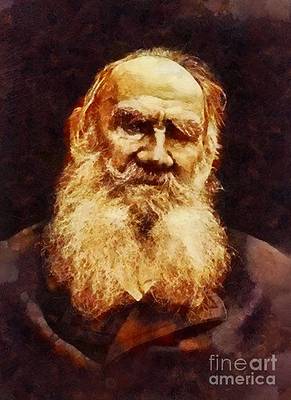Leo Tolstoy Archive
Written: 1852
Source: Original Text from WikiSource.org
Transcription/Markup: Andy Carloff
Online Source: RevoltLib.com; 2021

" Where are these dreams ? " now thought the youth, as he approached his house after his visits. " It is now more than a year that I have been seeking happiness upon this road, and what have I found ? It is true, at times I feel that I might be satisfied with myself, but it is a kind of dry, mental satisfaction. Yes and no, I am simply dissatisfied with myself ! I am dissatisfied because I have found no happiness here, and yet I wish, I passionately wish for happiness. I have not experienced enjoyment, and have already cut off from me everything which gives it. Why ? For what ? Who has been better off for it ? My aunt was right when she said that it is easier to find happiness than to give it to others.
" Have my peasants grown richer ? Have they been morally educated and developed ? Not in the least. They are not better off, but I feel worse with every day. If I only saw any success in my undertaking, if I saw gratitude — but no, I see the perverted routine, vice, suspicion, helplessness.
" I am wasting in vain the best years of my life," he thought, and it occurred to him that his nurse had told him that his neighbors called him a " minor " ; that there was no money left in his office; that the new threshing-machine, which he had invented, to the common delight of the peasants, only whistled but did not thresh, when it was for the first time set in motion in the threshing-barn, before a large audience ; that from day to day he might expect the arrival of the agrarian court in order to take an invoice of the estate, since he had allowed payments on the mortgage to lapse, in his preoccupation with all kinds of new farm undertakings.
And suddenly, just as vividly as before, came to him the picture of his walk through the forest, and the dream of a country life ; and just as vividly stood before him his student room in Moscow, in which he used to stay up late at night, by one candle, with his classmate and adored sixteen-year-old friend. They read and recited for hours in succession some tiresome notes of civil law, and, after finishing them, sent for supper, pooled on a bottle of champagne, and talked of the future that was in store for them. How differently the future had presented itself to a young student! Then the future was full of enjoyment, of varied activities, of splendid successes, and incontestably led both of them to the highest good in the world, as it then was understood by them, — to fame !
" He is walking, and rapidly walking, on that road," thought Nekhlyudov of his friend, " and I — "
At this time he had arrived at the entrance of the house, where ten or more peasants and domestics stood, waiting for the master with all kinds of requests, and he had to turn from his dreams to the reality before him.
Here was a ragged, disheveled, and blood-stained peasant woman who complained in tears of her father-in-law, who, she said, wanted to kill her ; here were two brothers who had been for two years quarreling about the division of their farm, and who looked upon each other with desperate malice ; here was also an unshaven, gray-haired servant, with hands quivering from intoxication, whom his son, the gardener, had brought to the master, to complain of his dissolute conduct ; here was a peasant who had driven his wife out of the house because she had not worked all the spring ; here was also that sick woman, his wife, who sat, sobbing and saying nothing, on the grass near the entrance, and displayed her inflamed, swollen leg, carelessly wrapped in a dirty rag —
Nekhlyudov listened to all requests and complaints, and he gave his advice to some, and settled the quarrels or made promises to others. He experienced a certain mixed feeling of weariness, shame, helplessness, and remorse, and walked to his room.